The Genron NPO President Yasushi Kudo opened the forum by describing the current state of the relationship between the two countries, explaining that a number of issues over the previous year have increased the friction between the two governments, and Japanese public opinion towards South Korea has taken a negative turn.
"Even the holding of this dialogue itself was threatened," Kudo explained. "But we were able to gather donations from almost 300 individuals who endorsed our position that the difficulties we now face are the very reason such a dialogue must exist."
Kudo cited the historical significance of the day, the 54th anniversary of the signing of The Treaty on Basic Relations between Japan and the Republic of Korea, and encouraging all present to take part in the discussion.
Yul Sohn, president of the East Asia Institute and professor at Yonsei University, provided a Korean perspective in opening remarks, while Kudo presented a Japanese perspective and highlighted some of the poll results for the audience. (Report available at https://www.genron-npo.net/en/opinion_polls/archives/5489.html ).

Japanese and South Korean Perception of National Security
Associate Professor Hideki Okuzono of the University of Shizuoka's Graduate School of International Relations was first to speak.
"In the past, the fact that Japan and Korea belonged to the same camp within the Cold War structure acted as a unifying force between the countries, but we haven't come up with something of similar value to replace that," Okuzono said.
He pointed out that the opinion poll showed an increase in the percentage of South Koreans who view North Korea as a military threat (67.4% →73.0%), implying that South Korean views on security are approaching the Japanese view.
While some differences exist, "Japan and Korea are both trying to keep the US engaged in Northeast Asia even as it delves deeper into an "America First" mindset, and both are looking into how to build a constructive relationship with China and how to eliminate the nuclear threat from North Korea," he explained.
Chosun Ilbo Tokyo Bureau Chief Hawon Lee provided a somewhat grim description of how it feels to work as a journalist in Japan when he said, "Sometimes you feel like a correspondent embedded in an enemy country."
He noted the broad diversity of opinion in his own country, and citing the conscripted workers issue, noted that many South Koreans believe that "promises made between nations must be kept." He called upon Japan to have the courage to come to the table and engage in dialogue about such issues.
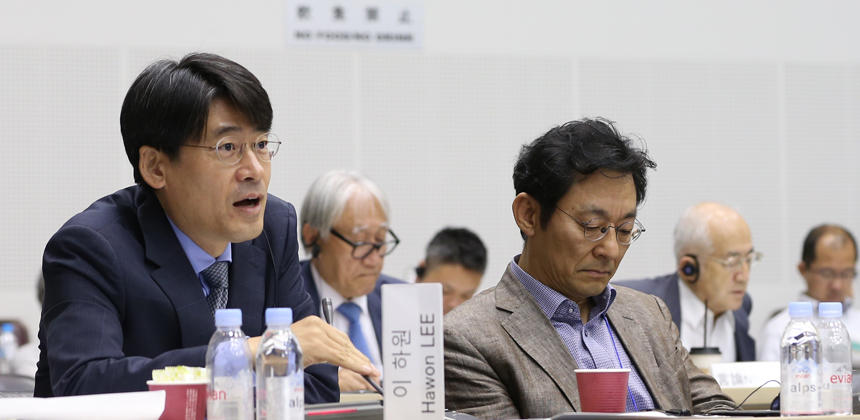
Shogo Aoki is president of a company called Noritsuisu that promotes exchange between young economic experts in Japan and Korea. He presented the somewhat pessimistic view that it is impossible to completely separate intergovernmental issues from relationships in civil society. However, he noted that young people in both countries tend to have more positive impressions of their neighbor, and proposed the establishment of a youth-focused version of the forum to encourage them to discuss political issues and provide feedback to their governments.
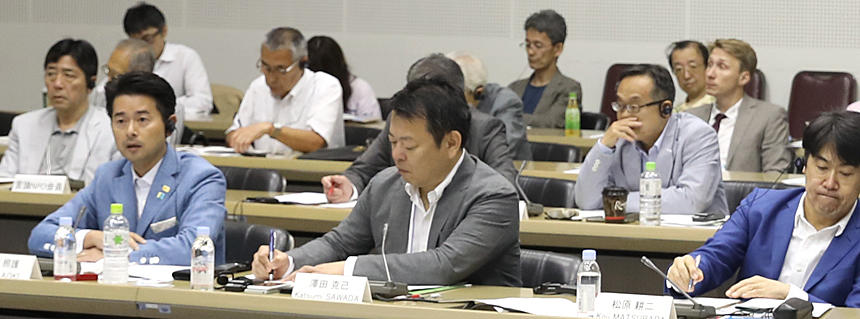
Hyung Jin Cho is a representative director at Chorokbaem Media, which produces a number of Korean drama series, and he provided a more positive outlook on harnessing the rich cultural exchange between members of the younger generation. He believes that online media have increased the speed at which people can share their culture with other countries, and that the trend is irreversible. Moreover, Cho thinks cultural exchange is expanding the breadth of understanding among younger people in both countries, and as they will be the next generation of leaders, he believes that although cultural exchange will never directly resolve issues of diplomacy, "it will provide a starting point."
Associate Professor Yongseok Kwon of the Graduate School of Law at Hitotsubashi University moves between the academic worlds of both Japan and Korea, studying not only political and diplomatic aspects of the Japan-Korea relationship, but also cultural aspects.
Kwon asserted that, "Culturally speaking, South Korea is the most pro-Japanese country in the world. There is no other country that consumes as much and as diverse a range of Japanese culture."
But he did point out one problem that exists in Japan.
"While you will see a diversity in opinions about Japan in the Korean media, there is no such diversity in Japan, with Japanese media tone tending to lean towards the government position," he explained.
Profesor Junya Nishino of Keio University's School of Law is more cautious of the potential influence of cultural exchange saying, "Sharing culture can help build a stronger sense of affinity between countries, but that doesn't lead to a deeper understanding."
He argued that, "In order to ensure the two countries can maintain a relationship long-term, people have to know the history of Japan and South Korea and have to understand how today's relationship was built. Intergovernmental relationships and civil society level exchange should be kept separate, but there needs to be a mutual understanding regarding political issues on the civil side as well."
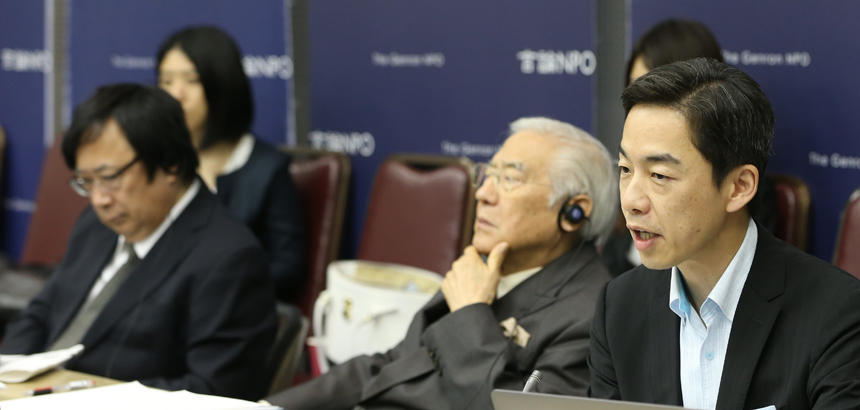
How media framing influences societal opinion
While the internet is contributing greatly to international exchange among youth, Professor Ki Jung Kim of Yonsei University fears that the way the media frames issues is unnecessarily increasing discord between Japan and Korea.
Koji Matsubara is a newscaster with the BS-TBS program Hodo 1930, and added to Kim's remark, telling the forum that his program presented 20 special reports on Korea in the previous six months, and they made him "painfully aware" of how little he knew about Korea.
"News programs on terrestrial television have little time to work with, so they tend to report only on strongly-worded statements by politicians that will have an impact, without providing any background information," Matsubara explained.
Professor Yasuyo Sakata of the Kanda University of International Studies also discussed the Japanese media's framing of Korea.
"Whenever the Korean media criticizes Japan, it is dismissed as an expression of anti-Japanese opinion in Japan," she said. "Although Japan-Korea relations are becoming increasingly multi-faceted, the framework of perception is still rooted in the past." She also described how the survey clarified Korean views on Japan and Northeast Asia. "It is timely in the sense that the information helps break down the one-sided perception," he said, and shared his belief that the media needs to put more effort into destroying stereotypes.
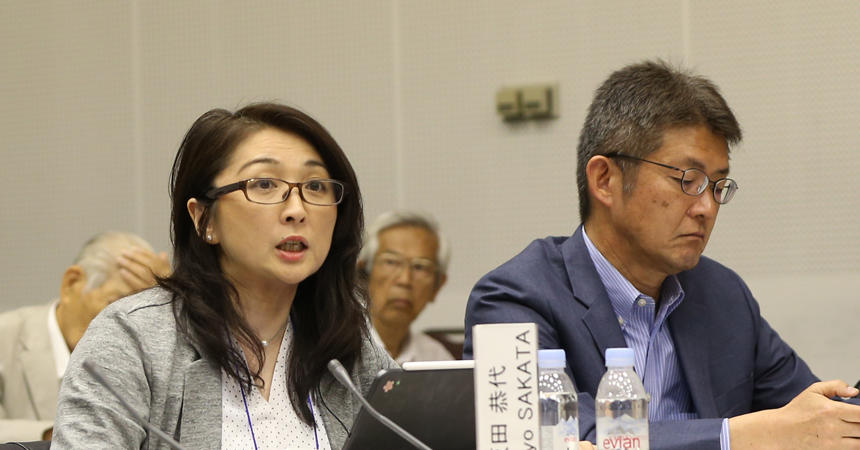
Woong-rae Noh belongs to the ruling Democratic Party as a member of the South Korean National Assembly, and he said that "Misapprehensions and suspicions are born out of a lack of mutual understanding."
However, he also called for understanding regarding the distrust that remains among South Koreans, pointing out that the annual visits to Yasukuni Shrine by Japanese politicians cause South Koreans to "question whether Japanese remorse regarding the war is sincere."
Regarding the conscripted workers issue, he expressed his belief that "Agreements between states should be followed. Legally, there are limitations to what can be agreed between the two countries, but I think a compromise can be reached if both work diplomatically to find a solution."
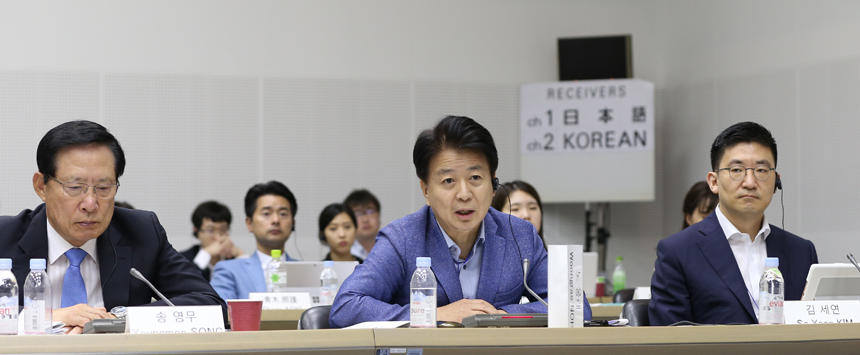
National Assembly member Se Yeon Kim belongs to the Liberty Korea Party. Kim also touched upon historical issues and the difficulty of sweeping away the distrust felt on both sides.
"It seems that both countries think the other country is going back on past decisions and actions," he explained.
Regarding diplomatic and security issues, Kim said, "Korea believes it necessary to strengthen the relationship with China to find a resolution to the North Korea problem. I hope that the Japan will try and think about what sort of diplomacy it would pursue if it were in Korea's position."
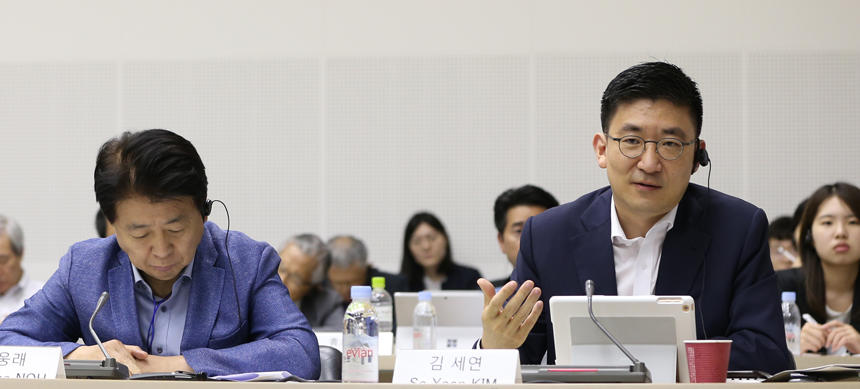
Increasing public understanding of the issues
Seiichi Kondo, former Commissioner of the Agency for Cultural Affairs, recognizes the media has limited ability to improve relations. Deteriorating national sentiment in Japan may be rooted in growing dissatisfaction in Japanese civil society due to pressures from globalization and the introduction of AI, and it may be exacerbated by intergovernmental issues and media coverage.
"We can do nothing about the fact that politics is about power, finance is about profit, and media is about ratings. Citizens need to understand those limits, and should find their own position on issues without getting caught up in what people in political or financial circles are saying."
A former UNESCO ambassador, Kondo supported his point with an excerpt from the UNESCO constitution, which states that peace cannot be based exclusively upon political and economic efforts by governments. It must be founded "upon the intellectual and moral solidarity of mankind."
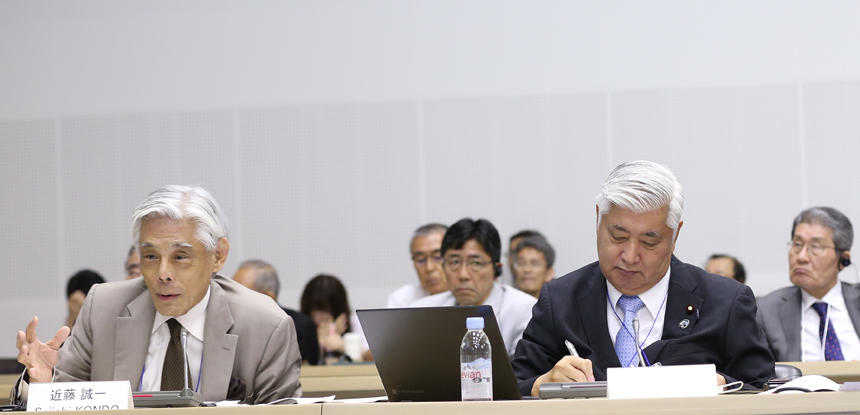
Loss of opportunity from a lack of cooperation
Former South Korean Ambassador to Japan Kak Soo Shin addressed the forum next.
"What's important is not only the visible damage arising from the deteriorated relationship," he said. "But also the loss of opportunity due to the relationship not being improved."
Shin presented three items that must be addressed: domestic issues such as decreased birth rates, aging populations and the onset of the fourth industrial revolution; the future of Northeast Asia, which is dealing with the US-China conflict and US isolationism; and the danger to freedom and multilateralism posed by the global rise in nationalism.
"If Japan and Korea were able to cooperate in these conditions, we would be able to build a much better world," Shin argued.
Professor Taewook Choi of Hallym University looks at Japan-Korea cooperation from Asian and global perspectives. Referring to the joint declaration signed by President Kim and Prime Minister Obuchi in 1998, he said, "No one expected historical issues to be resolved, but researchers had high hopes that Japan and Korea were creating a new future for the region. Cooperating on various levels, from education to AI to handling aging populations, is making those historical issues grow smaller."
Choi suggested that Genron could add a question to the opinion poll on where Japan and Korea can cooperate in the future.
Yongmoo Song is the Former South Korean Minister of National Defense, and he explained that the Moon administration's goal is to resolve the North Korean nuclear issue and reunify the Korean peninsula, eventually expanding liberal democracy into China and Siberia. He said that South Korea is preparing to take on a role similar to that of West Germany, which, after the reunification of East and West Germany, took the lead in integrating the East's economy with the EU and improving relations with Russia. "That will be an opportunity for Japan and Korea to work together," Song said.
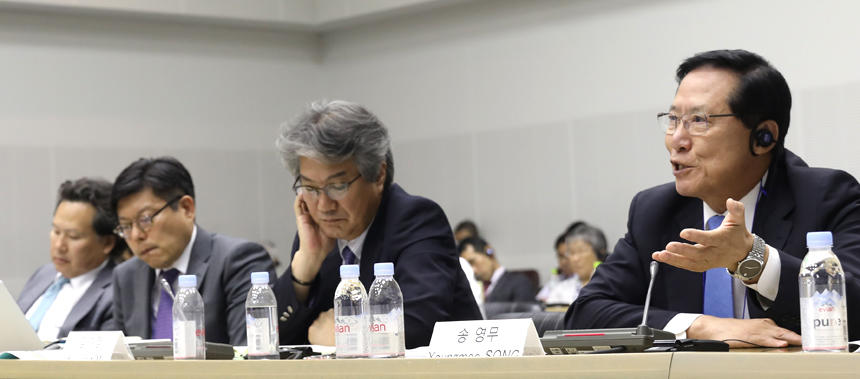
Does the public recognize the "new normal" of the Japan-Korea relationship?
Towards the end of Session One, Kudo again emphasized the importance of gathering experts on Japan-Korea relations to engage in public dialogue. However, he noted that of the 384 Japanese experts polled by Genron NPO, approximately 30% were negatively disposed to improving the relationship. Kudo asked the panelists their thoughts about the risk of further deterioration of public sentiment towards each country if such expert opinions reach the general populace.
Mainichi Shimbun Foreign News Department Director Katsumi Sawada responded that the relationship between Japan and Korea has become more equal with the increase in Korean power, calling it the "new normal" between the countries, and proposed one reason for the decline in Japanese public perception of Korea.
"Perhaps older people, including experts, have been unable to accept that change, and therefore have a strongly negative view towards Korea," he suggested.
He also pointed to a major difference in the two countries regarding why the Japan-South Korea relationship is important. The most popular response in South Korea pointed to an increase in mutual benefit with greater financial and industrial interdependence. However, Japanese respondents selected answers such as "because we are neighbors" or "because we are both Asian," and Sawada believes that such an emotional outlook has a greater risk of deteriorating rapidly whenever issues arise.
Professor Yoshihide Soeya of Keio University's School of Law said, "Historically speaking, Japanese opinion on Korea changed regularly while Korean opinion on Japan remained consistent, but now that situation has reversed."
He pointed out that South Koreans are having an increasingly positive view of Japan, one that is unaffected by intergovernmental relations, and Japanese people do not recognize the dynamic nature of South Korean society.
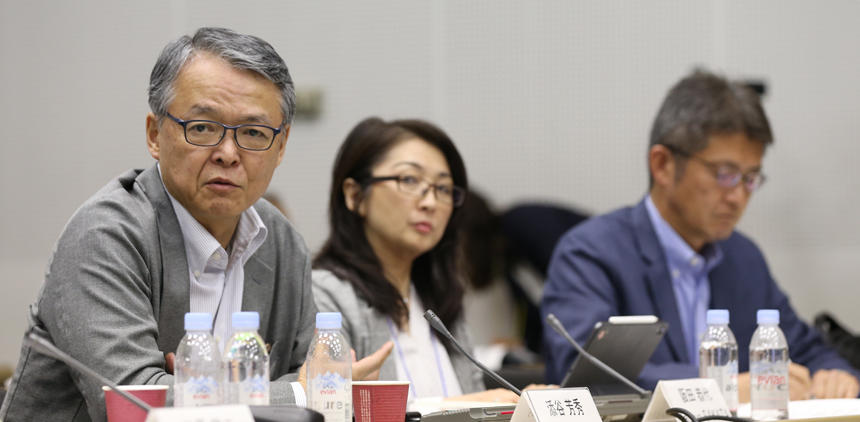
Sohn summarized the discussions from the Korean perspective, saying, "In South Korea, there has been a decoupling of government policy towards Japan and public opinion. But in Japan, there is a kind of 'negative coupling' in which public sentiment is being affected by intergovernmental relations, even though exchange with South Korea is progressing positively."
Kudo brought Session One to a close with a plea to panelists to be more open in expressing their true beliefs during the upcoming discussions in Session Two.

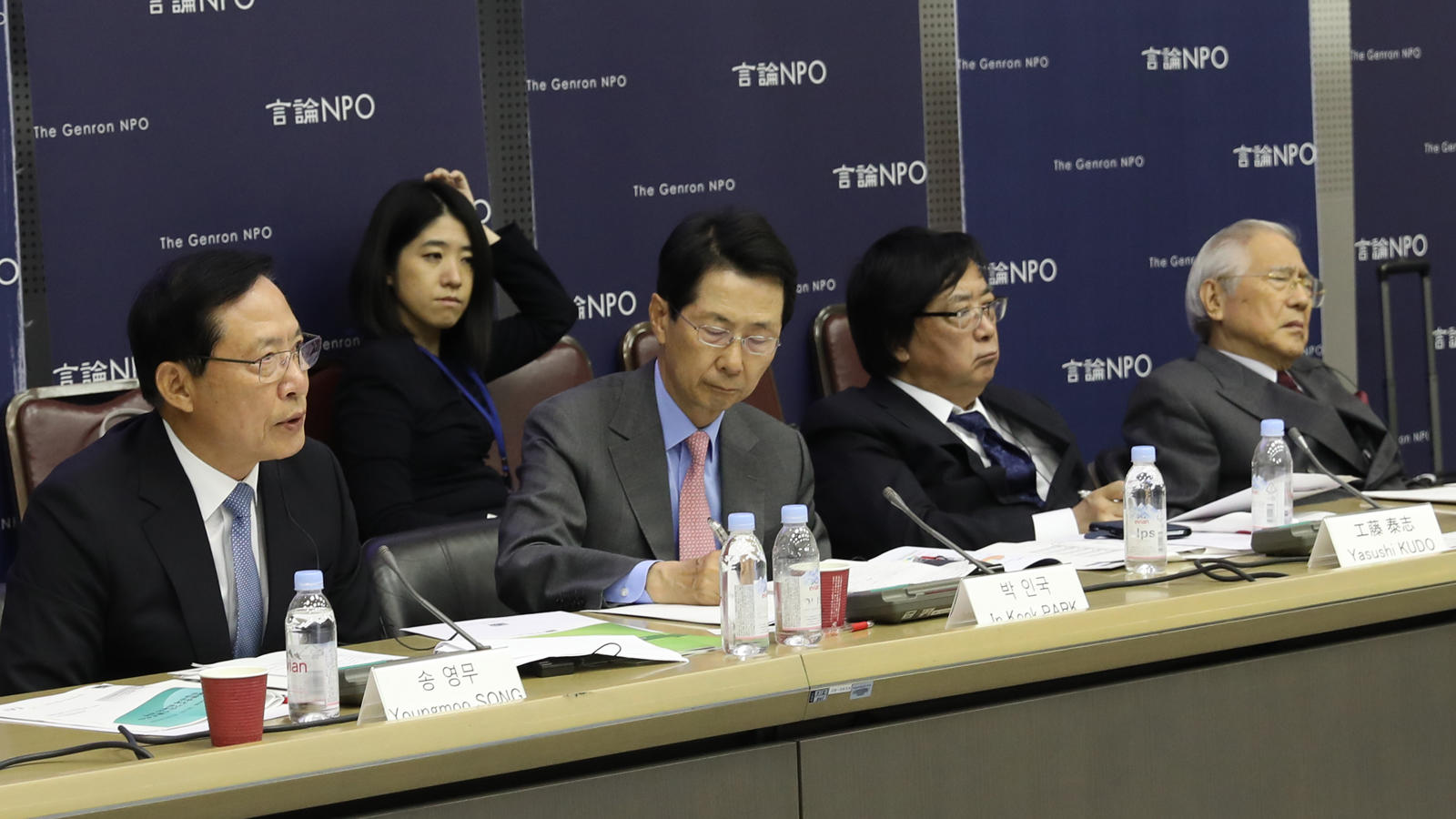
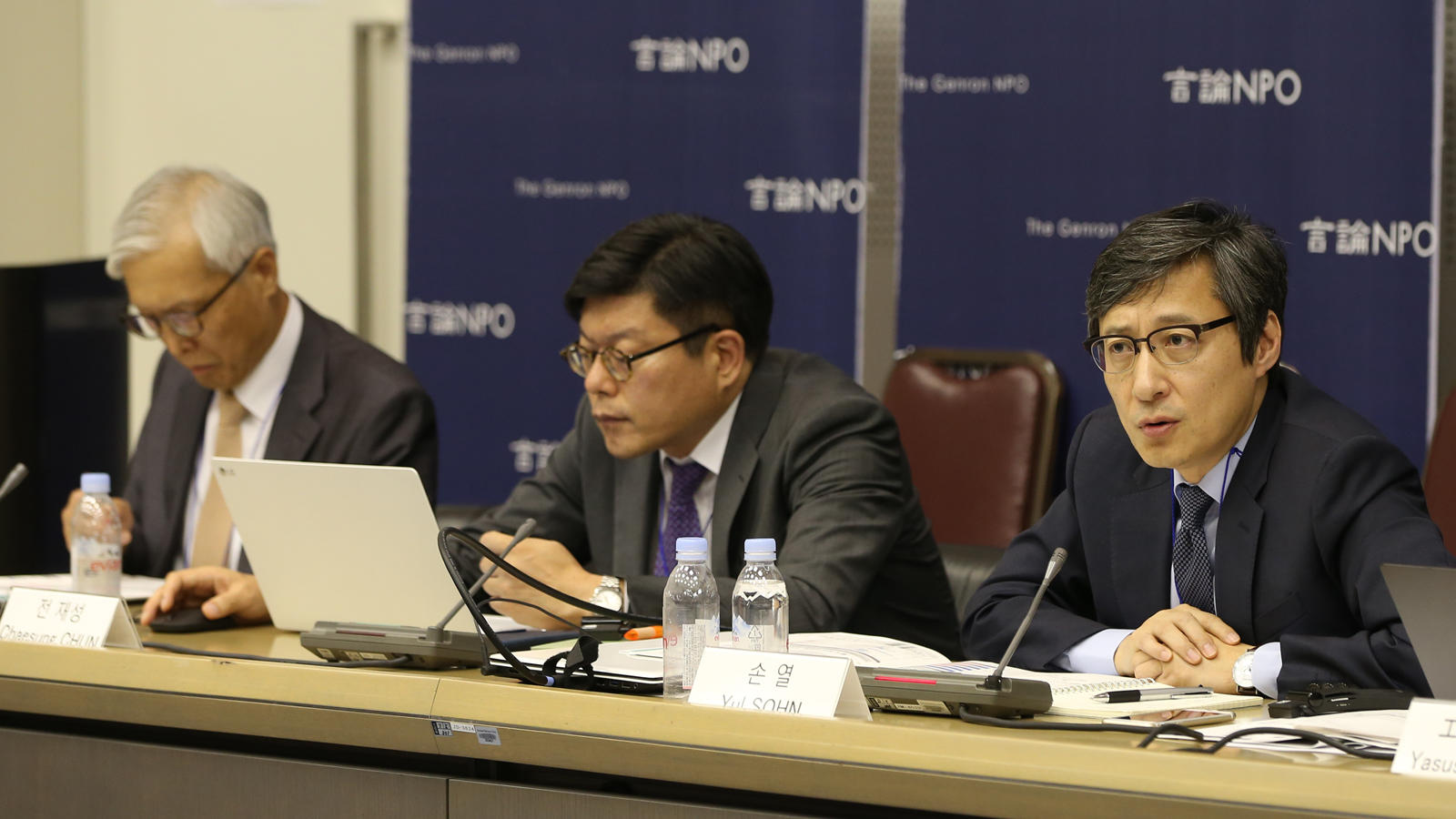

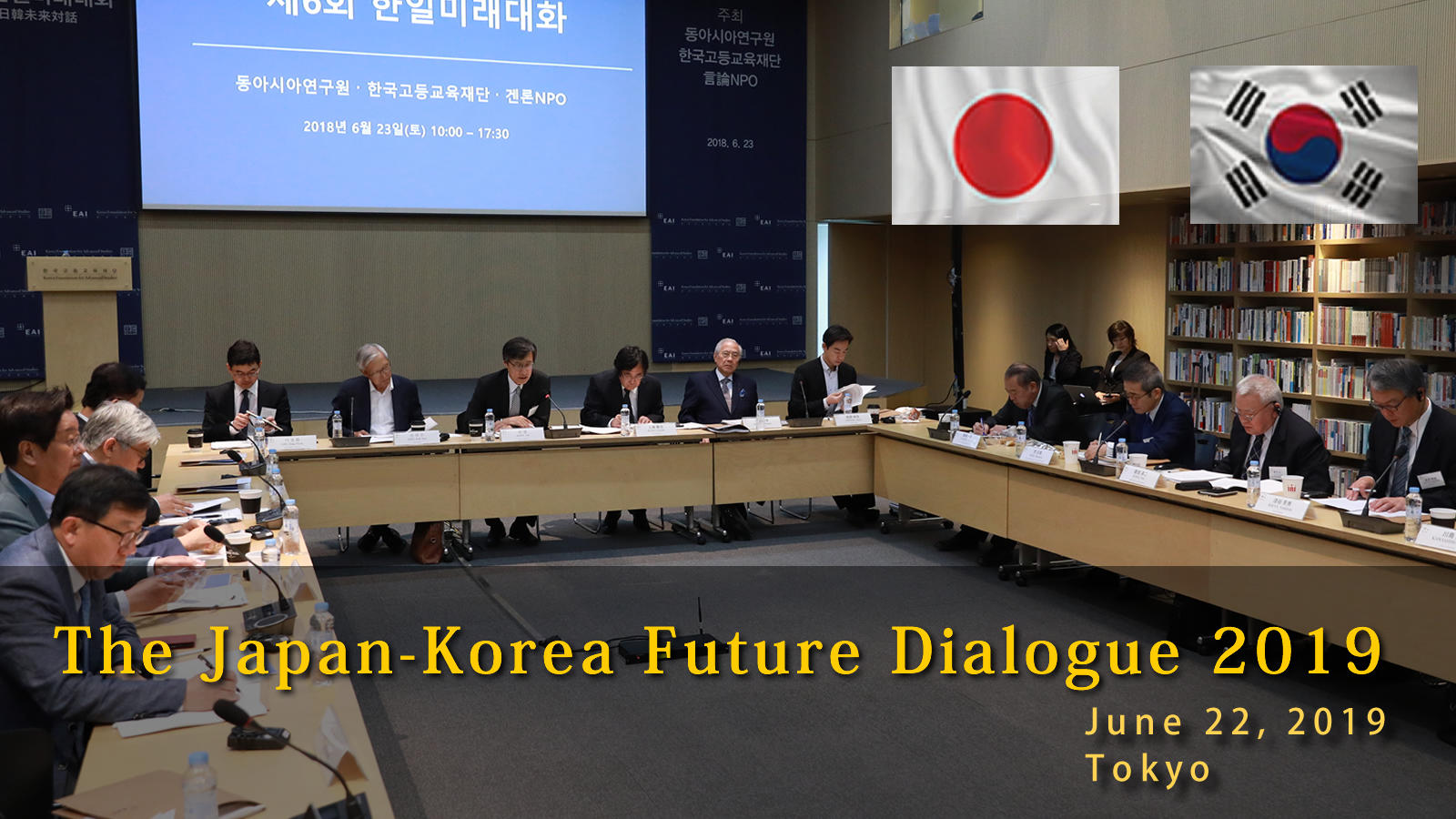
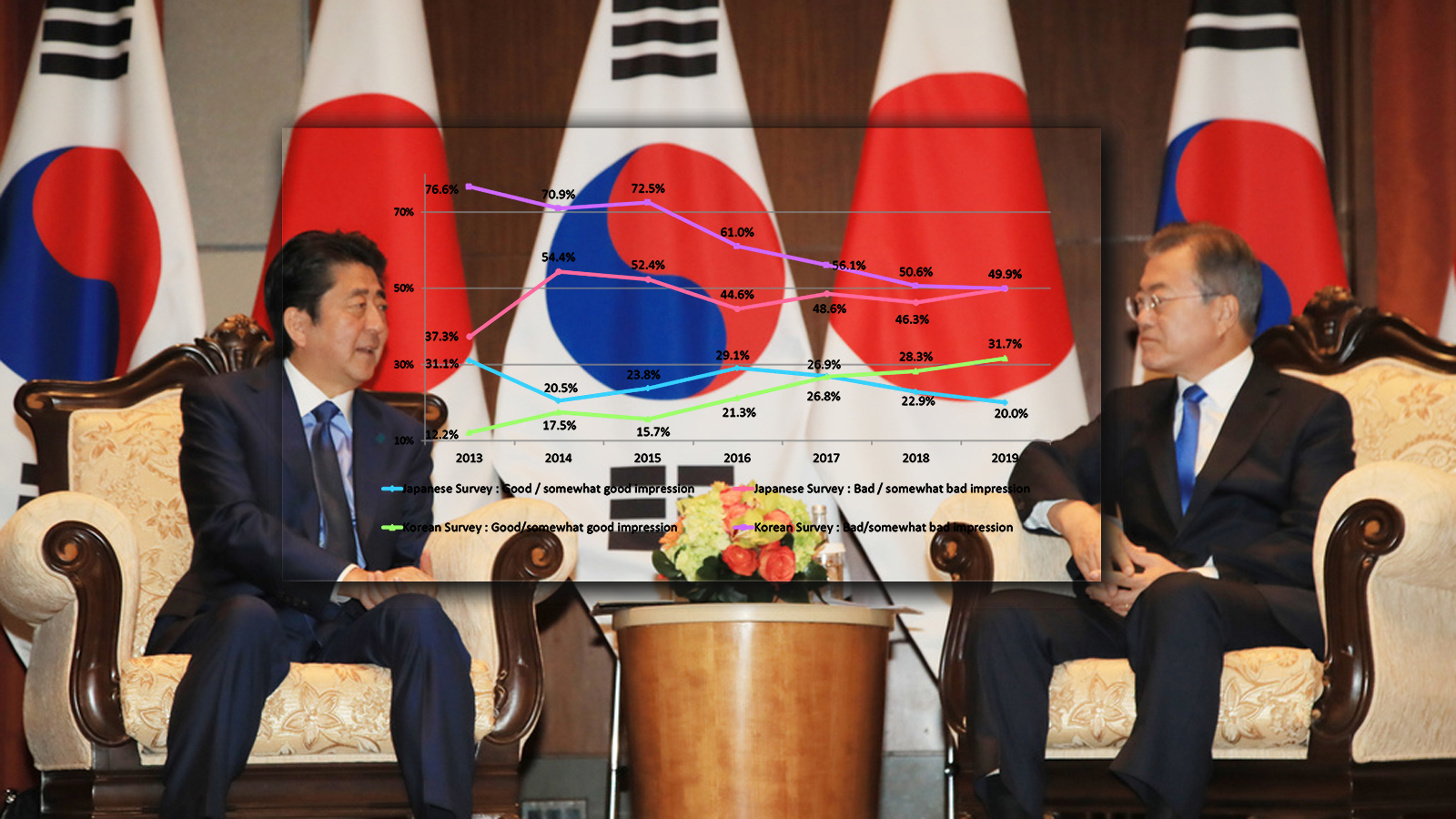
Post a comment